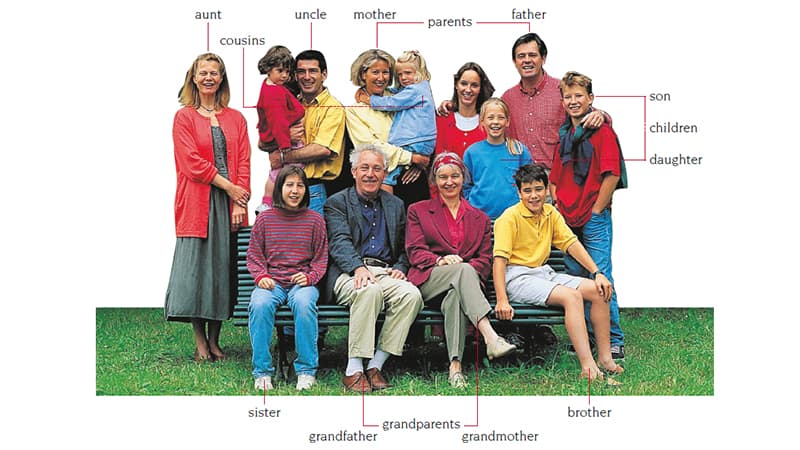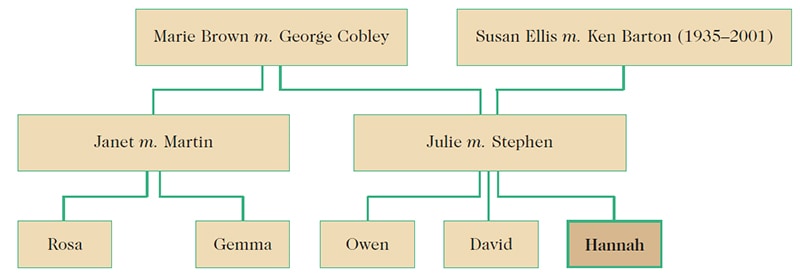Quantos membros há em sua família? Como você denomina suas relações de parentesco?
Nesta quarta aula do nosso curso de inglês online, você irá aprender como apresentar a sua família para amigos e conhecidos.

Verbs to have and to be
Estes verbos são muito comuns em inglês. São usados em frases simples, como as que serão mostradas abaixo, mas também como verbos auxiliares em orações mais complexas.
Estes verbos formam o present simple da seguinte forma:
1. Forma afirmativa
To have
I have two brothers.
You have two brothers.
We have two brothers.
They have two brothers.
He has two brothers.
She has two brothers.
It has two brothers.
To be
I am brazilian.
You are brazilian.
We are brazilian.
They are brazilian.
He is brazilian.
She is brazilian.
It is brazilian.
2. Forma negativa
To have
I don’t have a sister.
You don’t have a sister.
We don’t have a sister.
They don’t have a sister.
He doesn’t have a sister.
She doesn’t have a sister.
It doesn’t have a sister.
To be
I am not brazilian.
You are not (aren’t) brazilian.
We are not (aren’t) brazilian.
They are not (aren’t) brazilian.
He is not (isn’t) brazilian.
She is not (isn’t) brazilian.
It is not (isn’t) brazilian.
1. Observe abaixo a árvore genealógica de Hannah e determine o parentesco entre ela e as pessoas listadas a seguir: Stephen, Martin, Marie and George, Janet, David, Susan, Rosa and Gemma, Julie.

2. Escolha a forma correta do verbo to be para completar as frases abaixo.
a) My brother Owen (is / are) at university.
b) I (is / am) the only daughter in my family.
c) Gemma (is / are) the same age as me.
d) Her name (is / am) Rosa.
e) We (is / are) a family.
f) They (are / is) my grandparents.
3. Agora coloque as frases da questão anterior na forma negativa, dessa forma:
4. Ouça Hannah falar sobre sua família enquanto lê o que ela diz. Observe
em que sílaba recai a ênfase nas palavras em itálico. Ouça novamente e
repita estas palavras.
I live with my mother and my father and my two brothers. They are called Owen and David. Owen is twenty and he’s at university. David is sixteen and he’s at school, like me. I have two grandmothers and one grandfather. My other grandfather is dead. I have one uncle and one aunt. My aunt Janet is my mother’s sister. They have two daughters. Rosa is ten and Gemma is fourteen, like me. They are my cousins
20 MINUTES +
Escreva algumas frases a respeito de sua família e pratique lendo-as em voz alta.
I have ………………………………
My mother’s name is …………………………………
I live with my …………………………………
Word Bank
brother (substantivo) = irmão.
child [plural: children] (substantivo) = criança.
cousin (substantivo) = primo(a).
daughter (substantivo) = filha.
family (substantivo) = família.
father (substantivo) = pai.
grandfather (substantivo)= avô.
grandmother (substantivo) = avó.
grandparents [plural] (substantivo) = avós.
mother (substantivo) = mãe.
parents [plural] (substantivo) = pais.
sister (substantivo) = irmã.
son (substantivo) = filho.
Respostas:
Exercício 1:
Stephen: father
Marie and George: grandparents
David: brother
Rosa and Gemma: cousins
Martin: uncle
Janet: aunt
Susan: grandmother
Julie: mother
Exercício 2:
a) is; b) am; c) is; d) is; e) are; f) are.
Exercício 3:
a) My brother Owen is not at university.
b) I am not the only daughter in my family.
c) Gemma is not the same age as me.
d) Her name is not Rosa.
e) We are not a family.
f) They are not my grandparents.
 Sair da aula
Sair da aula